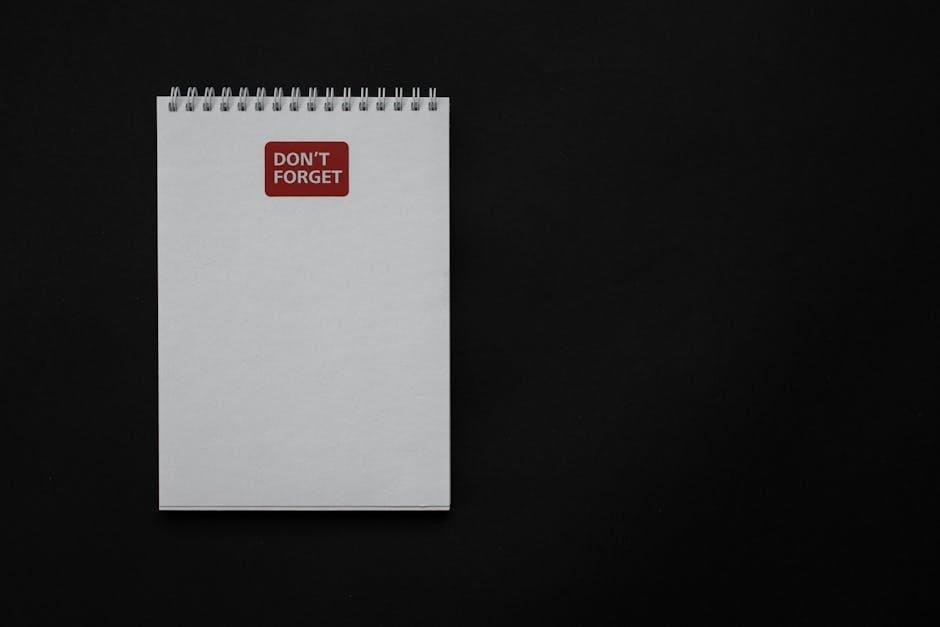Psychiatric progress note templates are essential tools for mental health professionals, providing structured formats to document patient progress efficiently and maintain accurate records for compliance and clear communication․
Importance of Psychiatric Progress Notes in Mental Health Care
Psychiatric progress notes are crucial for tracking patient progress, ensuring continuity of care, and maintaining clear communication among healthcare providers․ They document symptoms, treatment responses, and changes in mental status, aiding in accurate diagnosis and effective treatment planning․ These notes also serve as legal records, protecting both patients and practitioners by providing a transparent account of care․ Using structured templates enhances consistency, compliance, and efficiency in documentation, making them indispensable in modern mental health care;
Overview of the Psychiatric Progress Note Template PDF
The psychiatric progress note template PDF is a structured document designed to streamline documentation for mental health professionals․ It typically includes sections for patient demographics, session details, mental status exams, symptom reviews, treatment plans, and progress tracking․ Available in both PDF and Word formats, it ensures easy accessibility and customization․ The template is adaptable for various practitioners, including psychiatrists, nurses, and physician assistants, promoting consistency and professionalism in clinical documentation while maintaining patient confidentiality and care continuity․

Key Components of a Psychiatric Progress Note Template
A psychiatric progress note template includes patient information, session details, mental status exams, symptom reviews, treatment plans, and progress tracking, ensuring comprehensive and organized documentation of patient care․
Patient Information and Demographics
Patient information sections in psychiatric progress notes include name, date of birth, patient identifier, and contact details․ This ensures quick access to personal and medical history, aiding continuity of care and accurate documentation․ Demographic data helps track patient populations and tailor treatment plans effectively, while maintaining confidentiality and compliance with professional standards․ These details are essential for streamlined communication and record-keeping․
Session Details and Interval Assessment
Session details include the date, time, and type of session, along with the provider’s name․ The interval assessment summarizes the patient’s condition since the last visit, noting changes in symptoms, behavior, or treatment response․ This section captures progress, challenges, and any new concerns, ensuring continuity of care and guiding future interventions․ Accurate documentation here supports effective treatment planning and communication among healthcare providers․
Mental Status Examination and Symptom Review
This section documents the patient’s mental status, including appearance, behavior, mood, affect, speech, and thought processes․ It also reviews current symptoms, such as anxiety, depression, or psychosis, and their severity․ Assessments of cognitive function, judgment, and insight are included․ This detailed review helps track symptom progression, inform treatment adjustments, and ensure comprehensive care tailored to the patient’s evolving needs and mental health status․

Benefits of Using Psychiatric Progress Note Templates
Psychiatric progress note templates enhance efficiency, ensure consistency, and support compliance with professional standards, making documentation clearer and more organized for effective patient care and communication․
Efficiency in Documentation
Psychiatric progress note templates streamline documentation, saving time by providing pre-designed sections for patient information, symptoms, and treatment plans․ They enable quick capture of essential details, reducing redundancy and allowing focus on patient care․ Templates in PDF and Word formats are easily accessible, while digital integration further enhances efficiency․ They ensure no critical information is overlooked, improving accuracy and consistency, and facilitating clear communication and coordination in mental health care․
Consistency in Record-Keeping
Psychiatric progress note templates ensure consistency in documentation, providing standardized sections for patient information, session details, and treatment plans․ This uniformity aids in clear communication among healthcare providers and simplifies tracking patient progress over time․ Templates also help maintain compliance with professional documentation standards, ensuring accuracy and reliability in patient records, which is vital for coordinated and effective mental health care․
Compliance with Professional Standards
Psychiatric progress note templates ensure adherence to professional documentation standards, reducing legal risks and enhancing the quality of care․ They incorporate essential elements required by regulatory bodies, such as patient identifiers, session details, and treatment plans․ By using standardized templates, healthcare providers can maintain compliance with industry guidelines, ensuring accurate and comprehensive documentation that aligns with professional expectations and legal requirements․

How to Write Effective Psychiatric Progress Notes
Psychiatric progress notes should be clear, concise, and organized․ Use templates to streamline documentation, ensuring accuracy and thoroughness in recording patient progress and treatment plans effectively․
Best Practices for Clarity and Accuracy
Use clear, concise language and avoid jargon․ Organize notes logically, starting with patient information and session details․ Include objective observations, subjective reports, and treatment plans․ Ensure accuracy by documenting facts and avoiding assumptions․ Regularly review and update notes to reflect progress․ Use templates to maintain consistency and compliance with professional standards․ Always maintain patient confidentiality and adhere to HIPAA guidelines in documentation․
Including Subjective and Objective Observations
Subjective observations include patient-reported symptoms, feelings, and concerns, while objective observations are measurable data, such as mental status exams, vital signs, and behavioral notes․ Documenting both ensures a comprehensive understanding of the patient’s condition․ Use clear headings in the template to separate these sections, ensuring accuracy and ease of review․ This approach supports effective diagnosis, treatment planning, and continuity of care, while maintaining professional standards․
Customizing Psychiatric Progress Note Templates
Customizing psychiatric progress note templates allows healthcare providers to tailor documentation to specific patient needs and clinical settings․ Templates are available in PDF and Word formats, enabling easy modification to include additional sections such as treatment plans, lab results, or specialized assessments․ This adaptability ensures comprehensive and personalized care while maintaining professional standards․
Optimizing Templates for Specific Needs
Customizing psychiatric progress note templates for specific needs enhances their effectiveness․ Providers can include or exclude sections based on patient requirements, such as adding treatment plans, lab results, or specialized assessments․ This adaptability ensures that documentation remains relevant and efficient․ Templates in PDF and Word formats allow easy modifications, enabling healthcare professionals to streamline their workflow while maintaining comprehensive and accurate records tailored to individual patient care․
Incorporating Additional Sections for Comprehensive Care
Enhancing psychiatric progress note templates with additional sections ensures comprehensive care documentation․ Sections like patient history, current symptoms, and risk factors provide a holistic view․ Including treatment plans, lab results, and family involvement further enriches the records․ These additions allow mental health professionals to track progress and make informed decisions, ensuring thorough and patient-centered care․ PDF and Word formats facilitate easy customization to meet diverse clinical needs․
Popular Formats and Tools for Psychiatric Progress Notes
Psychiatric progress notes are widely available in PDF and Word formats, offering easy accessibility and customization․ Digital tools like ICANotes enhance efficiency, streamlining documentation and improving patient care․
PDF and Word Formats for Easy Accessibility
PDF and Word formats for psychiatric progress notes are widely used due to their flexibility and ease of accessibility․ These templates can be downloaded, edited, and shared effortlessly, ensuring efficient documentation․ PDFs are ideal for maintaining a fixed layout, while Word documents allow customization․ Both formats often include fillable fields and pre-designed sections, making it simple to organize patient information․ Additionally, they are compatible with digital tools like ICANotes, enabling seamless integration for quick note generation and secure sharing․
Digital Tools for Streamlining Note-Taking
Digital tools like ICANotes mental health EMR simplify psychiatric note-taking by offering pre-designed templates and automated features․ These tools allow users to quickly generate progress notes, reducing administrative burdens․ With features like fillable fields and voice-to-text capabilities, documentation becomes efficient and accurate․ Digital platforms also enable secure sharing and easy access to patient records, ensuring seamless communication between healthcare providers․ This modern approach enhances productivity and maintains high standards of patient care․
Examples and Case Studies
Sample psychiatric progress note templates demonstrate effective documentation practices, showcasing real-world applications in clinical settings to enhance understanding and improve patient care outcomes through structured note-taking․
Sample Psychiatric Progress Note Templates
Sample psychiatric progress note templates provide structured formats for documenting patient sessions, including sections for patient information, session details, and mental status examination․ These templates, available in PDF and Word formats, offer customizable fields to capture essential data such as symptoms, treatment plans, and progress tracking․ They serve as practical examples for clinicians to streamline documentation and ensure comprehensive, organized patient records, facilitating better care coordination and communication․
Real-World Applications in Clinical Settings
Psychiatric progress note templates are widely used in outpatient clinics, inpatient settings, and counseling sessions to document patient interactions, treatment plans, and progress․ They enhance documentation accuracy, facilitate interdisciplinary communication, and ensure compliance with professional standards․ Templates are particularly useful for tracking symptom changes, medication adjustments, and therapy outcomes, making them indispensable tools in modern mental health care delivery․ Their versatility supports efficient and organized patient management across diverse clinical environments․

Best Practices for Using Psychiatric Progress Note Templates
Ensure using psychiatric progress note templates for consistency, accuracy, and compliance․ Regularly review and update notes, maintain confidentiality, and use digital tools for efficient documentation․
Maintaining Patient Confidentiality
Maintaining patient confidentiality is crucial when using psychiatric progress note templates․ Ensure all notes are stored securely, using password-protected PDFs or encrypted digital tools․ Limit access to authorized personnel and comply with HIPAA guidelines․ Avoid sharing sensitive information without consent․ Regularly audit access logs and train staff on confidentiality protocols to safeguard patient data effectively in both physical and digital formats․
Regular Review and Updates
Regularly reviewing and updating psychiatric progress notes ensures accuracy and relevance․ Schedule periodic audits to check for completeness and compliance with professional standards․ Update templates to reflect new guidelines or patient needs, ensuring consistency across all records․ This practice supports effective patient care and legal compliance, maintaining the integrity of documentation over time․
Psychiatric progress note templates are indispensable tools for modern mental health care, enhancing documentation efficiency, compliance, and patient outcomes while supporting continuous improvement in clinical practices․
The Role of Psychiatric Progress Note Templates in Modern Healthcare
Psychiatric progress note templates play a vital role in modern healthcare by standardizing documentation, ensuring consistency, and promoting efficient communication among healthcare providers; They streamline clinical workflows, enhance patient care quality, and support compliance with professional standards․ These templates are indispensable tools for psychiatrists, nurse practitioners, and mental health professionals, facilitating accurate and comprehensive documentation while maintaining patient confidentiality and improving overall treatment outcomes․
Future Trends in Mental Health Documentation
Future trends in mental health documentation emphasize the integration of AI-driven tools and digital platforms to streamline note-taking․ Voice-to-text capabilities and real-time collaboration features are expected to enhance efficiency․ Templates like the psychiatric progress note PDF will evolve to include data analytics for better patient insights․ Secure cloud-based systems will improve accessibility while maintaining confidentiality․ These advancements aim to reduce administrative burdens and focus more on patient-centered care and precise documentation․
